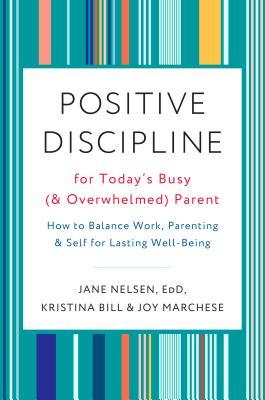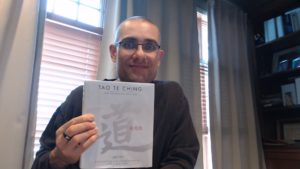Besides having a wide array of interests, you might be wondering why I am posting a book review on this topic as opposed to my usual delves into health. The fact is that relationships play a huge role in your overall health and are one of the main themes in my program for longevity and the first thing I work on with my clients.
Nobody is perfect and I am always looking for ways to improve myself and my tool kit for dealing with the relationships in my life. My wife and I listened to a presentation by a psychologist on talking to your adolescent. She recommended a number of books, and this seemed like one that we both could learn from, plus we were hoping that a family member might pick it up as well while we were vacationing together.
The full title of the book is Positive Discipline for Today’s Busy (& Overwhelmed) Parent, How to Balance Work, Parenting & Self for Lasting Well-Being. The Authors are Jane Nelsen, EdD, Kristina Bill and Joy Marchese.
Instead of a review per se, I have noted the ideas and thoughts that jumped off the page to me and that I thought were important enough to make notes for.
Helping children feel special.
One small but powerful thing can be to create nonverbal signals that you can use with each other to share love -ex. A quick thumbs up when you pass in the hall, or patting your heart to send a message of love across the room.
One of the most powerful ways to build strong bonds with your child is to spend scheduled special time with them.
Plan Special Time with Your Child
Brainstorm a list of things you would like to do together during your special time. When brainstorming, don’t evaluate or eliminate. Look at your list together and categorize.
Protect the family meal as often as you can.
Use your calendar to schedule non-negotiable family time. Schedule specific blocks of time for family meetings.
Take time for hugs. There is always time for a three-second hug.
Write Love Notes to your Children.
Don’t do anything for children that they can do for themselves.
Several points about Non-punitive parenting:
- Non-punitive parenting does not mean letting children “get away” with their behaviour.
- It does mean helping children explore the consequences of their choices in a supportive and encouraging environment so that lasting growth and learning can take place.
- Most people turn out “fine” even if they were punished, but they might have learned even more had they received both kindness and firmness to learn mistakes.
Are you satisfied with “fine” or do you want your children to have the kind of nurturing that helps them bloom into the best people they can possibly be?
Too many parents boss their children around and then wonder why they rebel.
Encourage Contribution. As children grow, they become more and more capable of contributing. Let small children help. Take time for training them over and over and over again.
Being both kind and firm is extremely important with teens. Here are some kind and firm tools to remember:
- Connection before correction. Connection can be physical touch, making eye contact, validating feelings, listening and being curious, making sure the message of love gets through, and showing empathy by getting into your teens world.
- Being excited about mistakes. Instead of lecturing and ridiculing, learn to celebrate mistakes.
- Joint Problem Solving. When teens are respectfully involved in problem solving, they are much more likely to keep agreements.
- Special time. Plan for a weekend breakfast together, or time to attend special functions that are of interest to your teen.
Children can be very creative when they are treated respectfully and allowed the opportunity. Ask your children for their ideas on solving the problem of organizing and getting chores done.
In family meetings but also at other times it is key to focus on solutions instead of blame. You will be amazed by the capability of children to find solutions when they are invited to do so.
Why would a child respond favorably to a situation that would certainly not be motivating to you?
Seven Guidelines for Positive Time-out
- Understand that a time of conflict is not a good time to teach and learn.
- During a time when there’s no conflict, teach the value of taking time to calm down until the rational brain can be accessed.
- Encourage your children to design a positive time-out area that will help them do whatever they need to do until they feel better and can do better.
- Suggest the child choose a name for this area, something other than “time-out”.
- Design your own tine-out area.
- During a conflict, ask your children if it would help them to go to their positive time-out place, or for you to go your own time-out area.
- If appropriate, follow up with teaching time at a later moment, when everyone is feeling better again.
4 Steps in order to recover from our mistakes -The 4 R’s of Recovery
Step 1-Recognize. “Oops, I made a mistake.”
Step 2-Reconnect. This can be done verbally by validating the child’s feelings: “I can see that my behaviour has hurt you.” Or it can be done nonverbally, through a hand on the shoulder, getting down to eye level, or holding hands.
Step 3-Reconcile. “I apologize.”
Step 4-Resolve. “What can we do to make things better? Let’s work on a solution together.”
Take responsibility for what you create in your life. Dig deep and figure out how you created the situation you complain about. Responsibility does not mean blame or shame. Awareness of personal responsibility gives you power and options to create what you want.
Inconsistent behaviour does not inspire confidence and communicates to others that we can be influenced or even manipulated. Consistency is key in all areas, be it with family or colleagues.
People will listen to you after they feel listened to.
Mindset profoundly impacts our ability to agree on a way forward and that the levels of actions both parties are prepared to take in order to work on the relationship. It impacts our ability to communicate with each other, express love, practice forgiveness, and satisfy our partners primary goal of belonging.
When children don’t believe they belong, they feel discouraged and may misbehave. Likewise, when you don’t feel loved, valued, and accepted by your partner, you are unlikely to put forth your most kind and loving behaviour.
Perfectionism is rooted in insecurity and a deep need to prove one’s worth by doing things flawlessly.
When partners feel unappreciated in their efforts to help, they may avoid being hurt by spending more time away from home or doing solo activities.
Many relationships are taking a backseat to the urgent demands of work and children. Little to no time is carved out to enjoy each other. This is a huge mistake. Children benefit when they witness a happy and loving partnership. Your children learn about relationships by observing you.
Special time should be a priority over other time commitments so that the relationship isn’t always downgraded to last on the list, which can easily happen if both partners work.
Affection is one of the most powerful ways to make your partner feel cherished. Regular affection sends a powerful message of belonging, which summons our most loving behaviours. Affection meets the core need to feel special and deeply cared for.
There is a special sense of connection when you share your innermost thoughts and feelings, hear the innermost thoughts and feelings of your partner, and find similarities to marvel at. The need for meaningful conservation continues throughout the relationship, and it is painful to both parties if intimate sharing stops. The cost to the relationship is loss of closeness and connection and belonging.
Many couples have conflict because one partner is unable to appreciate the separate reality of the others individuals thoughts, feelings, desires and beliefs. We advocate that both parties are free to see things differently based on their personal beliefs, and that those differences are accepted and valued by the other. Its ok to disagree on things.
Often it is sufficient to show interest and wonderment at your partners enthusiasm and to encourage him or her to explore those interests as much as possible. Your partner will feel truly valued and accepted, and you will hopefully encourage you in your interests in return.
Couple meetings should be separate from family meetings. Parents need some grown-up time to, to bond and strategize.
Couple Activity:
- Separately create a list of things you would like to do with your partner
- Get together and share your lists. How many of your items are the same?
- Brainstorm some other ideas that you would like to do together
- Divide list into regular things and bucket list things
- Get out your calendars and schedule time together. Make this a final part of your weekly couples meeting
- Journal about the difference this activity makes in your relationship and share with each other.
We tend to underestimate what our children can do. When we show faith in our children, they develop courage and faith in themselves. Instead of lecturing, fixing, or doing it for them, say, “I have faith in you. I know you can handle this.”
Explain the task in a kind way as you perform it while your child watches. Do the task together. Have your child do it by herself while you supervise. When she feels ready, let her perform the task on her own. Don’t step in and correct it or do it for her -let her own it.
If you don’t have faith in your children, how else will they learn to have faith in themselves? The foundation actions to show faith in your children are avoidance actions, such as avoiding overparenting, avoiding rescuing, avoiding fixing, and avoid reminding (lecturing).
Example is the best teacher. Do you expect your children to control their behaviour when you don’t control your own? Withdraw from the conflict and calm down. If you do make a mistake and lose it, apologize to your children.
Make sure each child is loved for being the unique human she is. Don’t compare the kids in a misguided attempt to motivate them to be like another child. This is very discouraging.
These items or ideas are the ones that talked to me for our family to either incorporate newly or to make an effort to get back to again. Anyone who reads this book likely will have different takeaways, and likely coming back to a book like this again after some time, different things will speak to you.
As I mentioned at the top, strong healthy relationships is part of my first pillar of Longevity that I work on with my clients. Interested to see if I can help you achieve your Longevity goals? Contact me.




